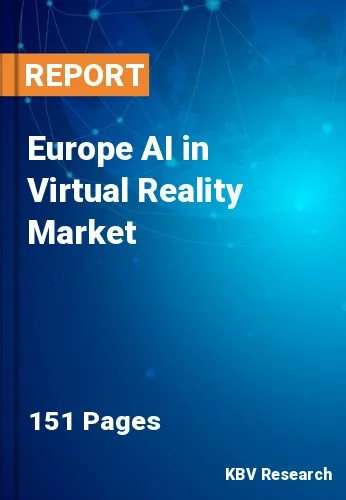Chapter 1. Market Scope & Methodology
1.1 Market Definition
1.2 Objectives
1.3 Market Scope
1.4 Segmentation
1.4.1 Europe AI in Virtual Reality Market, by Technology
1.4.2 Europe AI in Virtual Reality Market, by Platform
1.4.3 Europe AI in Virtual Reality Market, by Application
1.4.4 Europe AI in Virtual Reality Market, by Country
1.5 Methodology for the research
Chapter 2. Market at a Glance
2.1 Key Highlights
Chapter 3. Market Overview
3.1 Introduction
3.1.1 Overview
3.1.1.1 Market Composition and Scenario
3.2 Key Factors Impacting the Market
3.2.1 Market Drivers
3.2.2 Market Restraints
3.2.3 Market Opportunities
3.2.4 Market Challenges
Chapter 4. Competition Analysis - Global
4.1 KBV Cardinal Matrix
4.2 Recent Industry Wide Strategic Developments
4.2.1 Partnerships, Collaborations and Agreements
4.2.2 Product Launches and Product Expansions
4.3 Market Share Analysis, 2023
4.4 Top Winning Strategies
4.4.1 Key Leading Strategies: Percentage Distribution (2020-2024)
4.4.2 Key Strategic Move: (Product Launches and Product Expansions: 2023, Jan – 2024, Sep) Leading Players
4.5 Porter Five Forces Analysis
Chapter 5. Europe AI in Virtual Reality Market by Technology
5.1 Europe Computer Vision Market by Country
5.2 Europe Machine Learning & Deep Learning Market by Country
5.3 Europe Natural Language Processing (NLP) Market by Country
5.4 Europe Gesture, Speech Recognition & Others Market by Country
Chapter 6. Europe AI in Virtual Reality Market by Platform
6.1 Europe Head-Mounted Displays (HMDs) Market by Country
6.2 Europe Desktop Computers & Consoles Market by Country
6.3 Europe Mobile Devices Market by Country
6.4 Europe Projectors & Smart Glasses Market by Country
6.5 Europe Wearables & Body Tracking Devices Market by Country
Chapter 7. Europe AI in Virtual Reality Market by Application
7.1 Europe Gaming & Entertainment Market by Country
7.2 Europe Education & Training Market by Country
7.3 Europe Healthcare & Medical Market by Country
7.4 Europe Retail & E-commerce Market by Country
7.5 Europe Social Media & Communication Market by Country
7.6 Europe Industrial & Manufacturing Market by Country
7.7 Europe Tourism & Travel Market by Country
7.8 Europe Others Market by Country
Chapter 8. Europe AI in Virtual Reality Market by Country
8.1 Germany AI in Virtual Reality Market
8.1.1 Germany AI in Virtual Reality Market by Technology
8.1.2 Germany AI in Virtual Reality Market by Platform
8.1.3 Germany AI in Virtual Reality Market by Application
8.2 UK AI in Virtual Reality Market
8.2.1 UK AI in Virtual Reality Market by Technology
8.2.2 UK AI in Virtual Reality Market by Platform
8.2.3 UK AI in Virtual Reality Market by Application
8.3 France AI in Virtual Reality Market
8.3.1 France AI in Virtual Reality Market by Technology
8.3.2 France AI in Virtual Reality Market by Platform
8.3.3 France AI in Virtual Reality Market by Application
8.4 Russia AI in Virtual Reality Market
8.4.1 Russia AI in Virtual Reality Market by Technology
8.4.2 Russia AI in Virtual Reality Market by Platform
8.4.3 Russia AI in Virtual Reality Market by Application
8.5 Spain AI in Virtual Reality Market
8.5.1 Spain AI in Virtual Reality Market by Technology
8.5.2 Spain AI in Virtual Reality Market by Platform
8.5.3 Spain AI in Virtual Reality Market by Application
8.6 Italy AI in Virtual Reality Market
8.6.1 Italy AI in Virtual Reality Market by Technology
8.6.2 Italy AI in Virtual Reality Market by Platform
8.6.3 Italy AI in Virtual Reality Market by Application
8.7 Rest of Europe AI in Virtual Reality Market
8.7.1 Rest of Europe AI in Virtual Reality Market by Technology
8.7.2 Rest of Europe AI in Virtual Reality Market by Platform
8.7.3 Rest of Europe AI in Virtual Reality Market by Application
Chapter 9. Company Profiles
9.1 Microsoft Corporation
9.1.1 Company Overview
9.1.2 Financial Analysis
9.1.3 Segmental and Regional Analysis
9.1.4 Research & Development Expenses
9.1.5 Recent strategies and developments:
9.1.5.1 Partnerships, Collaborations, and Agreements:
9.1.5.2 Product Launches and Product Expansions:
9.1.6 SWOT Analysis
9.2 HTC Corporation
9.2.1 Company Overview
9.2.2 Financial Analysis
9.2.3 Research & Development Expenses
9.2.4 Recent strategies and developments:
9.2.4.1 Partnerships, Collaborations, and Agreements:
9.2.4.2 Product Launches and Product Expansions:
9.2.5 SWOT Analysis
9.3 Meta Platforms, Inc.
9.3.1 Company Overview
9.3.2 Financial Analysis
9.3.3 Segment and Regional Analysis
9.3.4 Research & Development Expense
9.3.5 Recent strategies and developments:
9.3.5.1 Product Launches and Product Expansions:
9.3.6 SWOT Analysis
9.4 Samsung Electronics Co., Ltd. (Samsung Group)
9.4.1 Company Overview
9.4.2 Financial Analysis
9.4.3 Segmental and Regional Analysis
9.4.4 Research & Development Expenses
9.4.5 SWOT Analysis
9.5 Sony Corporation
9.5.1 Company Overview
9.5.2 Financial Analysis
9.5.3 Segmental and Regional Analysis
9.5.4 Research & Development Expenses
9.5.5 SWOT Analysis
9.6 Unity Software, Inc.
9.6.1 Company Overview
9.6.2 Financial Analysis
9.6.3 Segmental and Regional Analysis
9.6.4 Research & Development Expenses
9.7 Magic Leap, Inc.
9.7.1 Company Overview
9.7.2 Recent strategies and developments:
9.7.2.1 Product Launches and Product Expansions:
9.7.3 SWOT Analysis
9.8 Apple, Inc.
9.8.1 Company Overview
9.8.2 Financial Analysis
9.8.3 Regional Analysis
9.8.4 Research & Development Expense
9.8.5 Recent strategies and developments:
9.8.5.1 Product Launches and Product Expansions:
9.8.6 SWOT Analysis
9.9 Qualcomm Incorporated (Qualcomm Technologies, Inc.)
9.9.1 Company Overview
9.9.2 Financial Analysis
9.9.3 Segmental and Regional Analysis
9.9.4 Research & Development Expense
9.9.5 Recent strategies and developments:
9.9.5.1 Product Launches and Product Expansions:
9.9.6 SWOT Analysis
9.10. Google LLC (Alphabet Inc.)
9.10.1 Company Overview
9.10.2 Financial Analysis
9.10.3 Segmental and Regional Analysis
9.10.4 Research & Development Expense
9.10.5 Recent strategies and developments:
9.10.5.1 Partnerships, Collaborations, and Agreements:
9.10.6 SWOT Analysis

